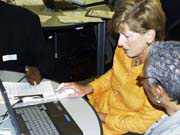It was back-to-school day Wednesday for Gov. Christine Todd Whitman and 20 teachers from Newark’s public schools. The group gathered at the Stevens Institute of Technology in a second floor classroom to launch a new $1.1 million state funded initiative designed to teach Newark public school teachers how to best use Internet technologies in the classroom.
Rather than make the usual speeches and engage in the now-customary back slapping that comes with the introduction of these sorts of programs, the governor elected to sit in on one of the program’s first classes instead.
Wearing an orange skirt suit and nursing an injured middle finger that she sprained in a bike accident earlier this month, Whitman pointed and clicked a mouse on command, while a pair of Stevens instructors introduced two electronic learning modules that they hope teachers will soon use in Newark schools.
“Most educators think of the Internet as an information superhighway – almost like a large library,” explained Josh Baron, one of the instructors Stevens has retained to train the teachers thanks to the grant. “But as we investigated it, we realized that the Internet has a lot more applications. We think that it is possible to bring in something new rather than simply using the Internet to replace old technologies, like the library.”
To demonstrate the power of the web to provide new ways to learn, Baron presented an exercise that asks students to imagine that they have just had a fight with a sibling and have climbed aboard a cargo ship as a stowaway. “But after being stuck on the ship for a little while, they get homesick and they have to figure out how to get home,” he said, raising his eyebrows as he clicked on a mouse connected to a computer whose screen was projected onto the wall behind him.
A dazzling array of small black dots attached to zigzagging white lines appeared on the wall. Each one of the dots represented an actual ship. Their locations and the path that they had traveled since leaving their homeports were being fed into the computer via the web in real time. The module asked the students to figure out where they were and where they would be the next day. “They have to figure this out so that their parents can come pick them up,” said Baron as the teachers laughed.
Will visit Stevens regularly
Over the coming year, Newark-based public school teachers will be coming to Stevens regularly to learn about electronic educational lessons like this one. Based on the reaction from the class of Newark teachers, it appears that the program will help them make better use of the technologies in their classrooms.
“There is a lot of stuff on the Internet,” said Pat Pontiero, an Eastside High School teacher. “A lot of teachers have never been exposed to this stuff before, but now we know exactly where to look. For the most part I had been using CD-ROMs and those sorts of things in class. This will broaden the material I use.”
In addition to providing training for teachers, Stevens will use a portion of the grant funding to buy computers and make Internet connections in New Jersey schools, university officials said. While the university has elected to focus on Newark this year, other school districts including Hoboken and Jersey City may be included in future years.
The grant runs for three years and is targeted towards the 30 neediest school districts in the state, which are known as Abbott school districts.
“This really is teaching teachers how to use the Internet,” said Whitman after the event, as Stevens President Hal Raveche stood next to her. “Students can not learn the right things if our teachers do not know how to use what is available to them in terms of technology.”
Aids to the Governor were quick to point out that Whitman was comfortable cruising along the Information Superhighway herself. They pointed out that she has her own e-mail account where constituents are welcome to contact her. And they said that she has a computer on her desk at the state capitol that she uses regularly.
Stevens officials seemed pleased that the state had tapped them to undertake the project. “We are not viewed as a traditional part of the educational establishment,” explained Dr. Edward Friedman, the director of Stevens Center for Improved Engineering and Science Education. “We are kind of the engineering oddballs and people look at us and say, ‘what do they know?’ But with programs like this I think that people are starting to realize that we can really help.”
